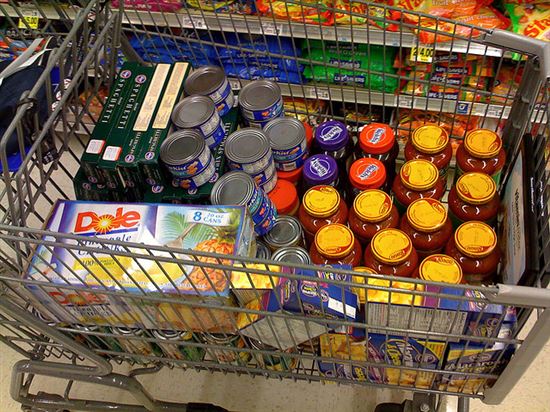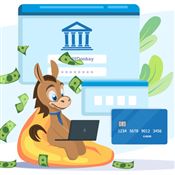23 Reasons Why Coupons Are Bad for Shoppers
Coupons are supposed to save you money, but watch out - this money-saving strategy can backfire and cost you big.
 |
| © waldoj (CC BY-SA 2.0) via Flickr |
If you're a regular couponer wondering where all your money is going or you’re thinking about signing up, consider these 23 research-driven reasons to think twice about using them.
COUPONS CAN AFFECT YOUR HEALTH
Your use of coupons can have a direct impact on your health - and it's not always positive. We rounded up some data that demonstrates just how dangerous coupons can be to your well-being.
1. They make it easier to give in to junk food cravings.
A study conducted by University of California researchers and published by the Centers for Disease Control found that 25% of online coupons are redeemed for snack foods, candy, and desserts. If you like to nibble on cookies, cakes, or other snacks in between meals, coupons may contribute to an increasing waistline.
2. You're less likely to make your own meals.
The results of that same study also showed that 14% of all online coupons redeemed were for processed foods, which are typically substantially higher in fat, calories, sodium, and preservatives than foods that are prepared from scratch. Scoring a deal on your favorite frozen pizza week after week may seem pretty sweet, but you might regret it when you start packing on extra pounds.
3. It's more tempting to guzzle down unhealthy drinks.
Soda, juice, and energy drinks may be more appealing to your taste buds than water, but their high sugar and caffeine content makes them anything but good for you. According to the California researchers, 12% of all online coupons processed are for beverages and half of those were redeemed for drinks with no real nutritional value.
4. Coupons for fresh foods are hard to come by.
Including plenty of fresh fruits, vegetables, and meats in your diet is a smart move, but it can be tough to afford if you're on a tight budget. When you consider the California study's results, which show that coupons for these products make up less than 5% of all those issued online, it's easy to see why cash-strapped shoppers are opting to fill their carts with unhealthy convenience foods instead.
5. Prescription drug coupons may have nasty side effects.
Using a coupon can bring down the cost of expensive prescription medications, but it's not always an advantage. A study published in the Journal of the American Medical Association suggests that drug coupons can be a dangerous crutch for patients with chronic health conditions. If the coupon isn't available anymore, patients may stop taking their meds altogether and see their health deteriorate even more.
6. Couponing can take a toll mentally.
Shows like TLC's Extreme Couponing give an inside look at what being a savvy couponer is like, but that's not reality for the average person. According to Inmar's 2014 Coupon Trends report, the average coupon redemption was $1.27. So if you're going into the store expecting to walk out with a cartload of groceries for practically nothing, you may be setting yourself up for feeling like a game-show loser.
 |
| © armydre2008 (CC BY 2.0) via Flickr |
THEY DON'T ALWAYS SAVE YOU MONEY
Coupons can lure you into a false sense of saving money when really, you're just throwing it away unnecessarily. A number of research studies have examined the ways in which coupons create mental money traps for shoppers. We've collected the most troublesome findings that highlight the financial pitfalls of coupons.
7. Coupons may trigger impulse buys.
Nearly 95% of shoppers use a list when hitting the grocery store, but that doesn't mean they always stick to it. An NPD Group study found that a quarter of shoppers toss things in their basket on impulse when they're able to get a deal on the price. Just because you have a coupon for something doesn’t mean it’s a smart purchase.
8. You can end up buying more than you need.
To combat extreme couponers who cash in big on coupon deals, manufacturers are increasingly upping the ante on purchase requirements. According to NCH Marketing, more than a quarter of coupons require you to buy at least two products to get a bargain, which may mean spending more than you normally would just to snag the savings.
9. Coupons can lead to unnecessary upgrades.
Sticking with store brands can save you money, but you may neglect that strategy when you come across a coupon for a brand-name item. It's easy to convince yourself it's a better deal, even if it means buying things you normally wouldn't. In a New York University study, shoppers who were presented with a coupon for a premium -brand item were more likely to buy it, regardless of price.
10. Having a pre-purchased coupon doesn't guarantee that you'll use it.
LivingSocial and similar sites offer coupon deals customized to your local area, but you should think twice before you shell out the money to purchase one. A survey from Rice University found that approximately 22% of all Groupon deals are never redeemed, which adds up to roughly $500 million that consumers are throwing away.
11. Generic brands might be cheaper.
Manufacturer's coupons are often for brand-name items, but you shouldn't assume the discount will give you the best overall deal. According to a Consumer Reports study, store-branded items are 25% cheaper than similar items sold under a more recognizable brand name. Before you buy the premium product, compare the after-coupon price to the generic version to see which one offers the most savings.
12. Coupons can be wasteful.
The United Nations estimates that in developed countries, consumers throw away an estimated 222 million tons of food each year. In the U.S. alone, 30% of the food we buy ends up in the trash. If you're clipping coupons so you can build a stockpile that you never end up using, you're essentially throwing away your time and money, not to mention the energy that's used to produce the food in the first place.
13. They can land you in debt.
Retailers use the lure of a big discount to get customers to sign up for a store credit card. The only problem is that if you don't pay off the balance right away, that 10% or 15% you saved on your first purchase will be overshadowed by the interest you'll end up paying. Not only that, but research has shown that when you pay with plastic, you're more likely to overspend, so opening up a new card just to get the coupon is a double whammy.
14. They push you to hit a spending goal.
One of the tactics retailers use to get you to loosen up your purse strings is to require you to spend a certain amount before a coupon can be used. In a 2006 study, researchers concluded that when shoppers were presented with a coupon that required a minimum purchase, they spent substantially more compared to shoppers who used a coupon with no strings attached.
15. You'll end up shopping longer.
If you're carrying around a big stack of coupons, your shopping trip is likely to cost you more in terms of time and money. According to environmental psychologist Paco Underhill's book, "Why We Buy: The Science of Shopping,"Why We Buy: The Science of Shopping, the amount of time we spend in a store directly correlates to how much we spend. Walking around the grocery store for hours, hunting down deals, increases the odds of adding things to your cart that you didn't intend to buy in the first place.
16. Expiration dates pressure you into buying.
Coupons are only good for a set period of time, and while some retailers will give you a little leeway in accepting them past the expiration date, most don't. In one study, researchers found that the closer a coupon is to its expiration date, the more pressure consumers feel to buy the corresponding product. That mental need to feel like you've gotten a deal can be detrimental to your wallet if you let expiration dates dictate your purchases.
17. Digital coupons mean a higher grocery bill.
Storing coupons on your store loyalty card or downloading them through an app your phone is a pretty easy way to save, but you may be sabotaging yourself before you leave the house. According to a survey from marketing researcher GfK, digital coupon users spend an average of 42% more on groceries annually versus all other shoppers.
OTHER DRAWBACKS OF USING COUPONS
Aside from being a drain on your bank account, using coupons can also be a strain on your time. To finish up, we've outlined some other common problems couponers can run into that detract from their appeal.
18. Clipping coupons is time-consuming.
Unless you happen to be close friends with the Coupon Fairy, coupons are not just going to magically appear when you're at the grocery store checkout. You have to put in the time to track down deals, collect coupon flyers, and cut them out each week. While experts like the Krazy Coupon Lady have got it down to a two-hour session each week, you could easily spend double that amount of time when you're just starting out with couponing.
19. Finding the right coupons can be tough.
Billions of coupons are printed each year, but that doesn't guarantee you'll be able to find the savings you need. Another survey from NCH Marketing showed that 46% of shoppers said they had a hard time finding coupons for products they actually used.
20. You'll be hitting the stores more often.
Maintaining a steady supply of coupons means you'll be going back and forth to the store more frequently. The GfK survey found that on average, shoppers who use digital coupons make an average of 81 trips to the grocery store each year, versus 65 trips for consumers who skip the coupons.
21. Using coupons can make you a target for identity thieves.
Coupon phishing scams abound these days, and if you allow yourself to fall for one, it could end up costing you big. Scammers send out emails that seem legit, but as soon as you open it or click on a link, you're setting yourself up for trouble. These emails can contain malware that can harm your computer or tracking software to record your keystrokes. All a cyberthief needs to do is wait for you to log in to your bank account or enter your credit card number online, and they'll be able to help themselves to your assets.
22. They're not always legit.
There are a number of websites that offer coupons for sale, but if you're planning on buying them, you need to proceed with caution. Coupon counterfeiting is a huge problem that yields big money for crooks and big problems for consumers. In 2012, an Arizona woman was busted for running a $40 million counterfeiting operation from her home that involved selling fraudulent coupons on eBay.
23. Using coupons can drive prices up.
Coupons are meant to save shoppers money, but they can have the opposite effect for businesses. Researchers at Rice University found that Groupon deals were overwhelmingly unprofitable for many small businesses, for example. When a business ends up losing money because of a coupon promotion, it can rebound on the customer in the form of higher prices.
CONCLUSION
Using coupons to save money works only if you know what the biggest traps are and how to avoid them. If you notice that coupons are pushing your spending up instead of down, you may be better off cutting them out of your shopping strategy altogether.
Rebecca Lake is a journalist at CreditDonkey, a personal finance comparison and reviews website. Write to Rebecca Lake at rebecca@creditdonkey.com. Follow us on Twitter and Facebook for our latest posts.
Note: This website is made possible through financial relationships with some of the products and services mentioned on this site. We may receive compensation if you shop through links in our content. You do not have to use our links, but you help support CreditDonkey if you do.
Read Next:






